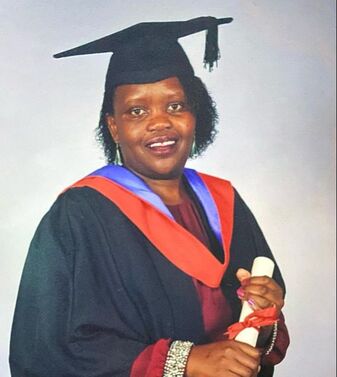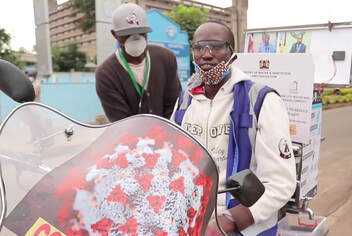OUR UNSUNG FRONTLINE WORKERSThroughout the COVID-19 pandemic we continue to acknowledge and applaud our frontline workers – the health workers, those who keep our transport running, the supermarket workers and many others. You may not have read much about them, or thought of them as you applauded our frontline workers, but support workers are very much in the frontline and providing much needed care and support to vulnerable members of the society.  Irene Waroma is a support worker in Coventry working with people with autism. For Irene and her colleagues, the COVID-19 pandemic and the lockdown has changed a lot of things in her field. Support work requires dedication and commitment to the client. Irene sees her role as providing the critical care and support to enable these vulnerable people in the society to stay in their homes. Through many years, a support worker is able to develop the trust and confidence of their client. It is this trust and confidence that Irene and her colleagues are working to maintain and sustain even during these difficult times. It means developing new routines for the clients as it is no longer possible to do the normal things. Instead of the usual walks to the parks, or shopping together, time is now only spent in the gardens, avoiding all unnecessary journeys, and visits from family members is totally restricted. The main aim is to ensure continuity and consistency for the client whose families have entrusted them to. As she and her colleagues work in close proximity to their clients and cannot adorn the full PPE as health providers do, Irene and other support workers are using new guidance to minimize the risk of infection for themselves and the client. This includes assigning the client one support worker where possible, or limiting the number of support workers for the client. The support workers themselves also keep to one client and as much as possible limit their involvement with other clients. Maintaining high standards of hygiene is very important in providing care during these times. Irene always wears gloves and also supports the client to wash their frequently wash or sanitize their and keep all surfaces clean and sanitized. How is Irene coping with all these changes? She admits that she worries about the risk of infecting the clients or infecting others due to exposure at work, while travelling to and from work or shopping. She also worries because she has an underlying health condition. Still she gets up every morning because she knows how important her work is for these vulnerable people and their families. These are our heroes!!!! Irene Waroma and all support workers are our heroes!!! We applaud you!!! OUR FROM COVENTRY TO NAIROBI The first COVID-19 case was confirmed in Kenya on 13th March 2020. On 25th March 2020, the Government of Kenya declared a national lockdown and instituted a range of measures aimed at curbing the spread of the virus, including isolating and treating confirmed cases, contact tracing and quarantine of individuals who have been in contact with COVID-19 cases. The government also instituted a dusk to dawn curfew in Nairobi and Mombasa. The public has been made aware of the preventive measures for COVID-19 such as social distancing measures and good hygiene practices, including handwashing with soap and water. It is now mandatory to wear facemasks in public places in Kenya. Lockdown measures are difficult to effectively carry out in any large city. This is even more so in some of the most densely populated areas of Nairobi, such as Majengo and Kibera where not only is it challenging to maintain social distance but also difficult to find running water for handwashing.COVID-19 is a global pandemic and the impact is being felt across the globe, from London to Nairobi. This is where Abubakar and Dennis Mariam, founders of AC19 come in. The two Kenyans, with support from TPN, under the leadership of Sophie Gitiba, are using innovative approaches to reach the residents of Majengo and other Nairobi slum dwellers, with information, personal protective equipment, including face masks, face shields and handwashing services!!!! Using a boda boda, these young men are able to reach at least 1000 people every day with these essential life saving equipment and handwashing services. Together we can slow down COVID-19. Together we can stop COVID19. One boda boda at a time!!!!! WE REMEMBER We know many Kenyans are affected by COVID-19. We wish all those who are undergoing treatment, speedy recovery, and offer encouragement and support to those who are caring for sick loved ones. We also remember all those who have lost their lives to COVID19. Our thoughts are with the families and friends at this difficult time.
2 Comments
|
ABOUT TPN Tujijenge Pamoja Network (TPN), is a cross country joint effort of over 200 diverse Kenya diaspora led organizations and groups in the UK. TPN seeks to form innovative partnership across the entire Kenyan Diaspora, that are supportive and empowering. IT’S YOUR STORY We will continue to share stories from other Kenyans in NHS and all other frontline areas in the fight against COVID-19. We must support our NHS and other frontline workers and heed to the government advise to stay home. Let us continue to encourage and support each other during these trying times. We are all in this together, and together we will overcome!!! If you have a story you would like us to include in our next newsletter, please share it.
Send to: [email protected] EditorCompiled by Kenya Healthcare C19 Support Group
KHC-C19 Support Group Editor: Dr Sarah Onyango Email: [email protected] ArchivesCategories |
Tujijenge Pamoja NetworkStrengthening unity, partnerships, collaborations, Diaspora voice...... |
TPN High Light Activities
Networking EventsBig Idea WorkshopsHot SeatPod EntrepreneurThemed ConferencesGood Cause Fund Raisers |
Diaspora Easter Conference Report 2015 http://kenyaembassy.com/pdfs/Final_report_Kenya_Easter_Diaspora_Conference_May132015.pdf |
TPN is a network for Kenyan Diaspora organisations that invites and encourages the interaction, partnerships and the strengthening of both the persons in the diaspora and their linkages with Kenya.
For the Diaspora policy download the file below
| kenya_diaspora_policy.pdf | |
| File Size: | 265 kb |
| File Type: | |
 RSS Feed
RSS Feed